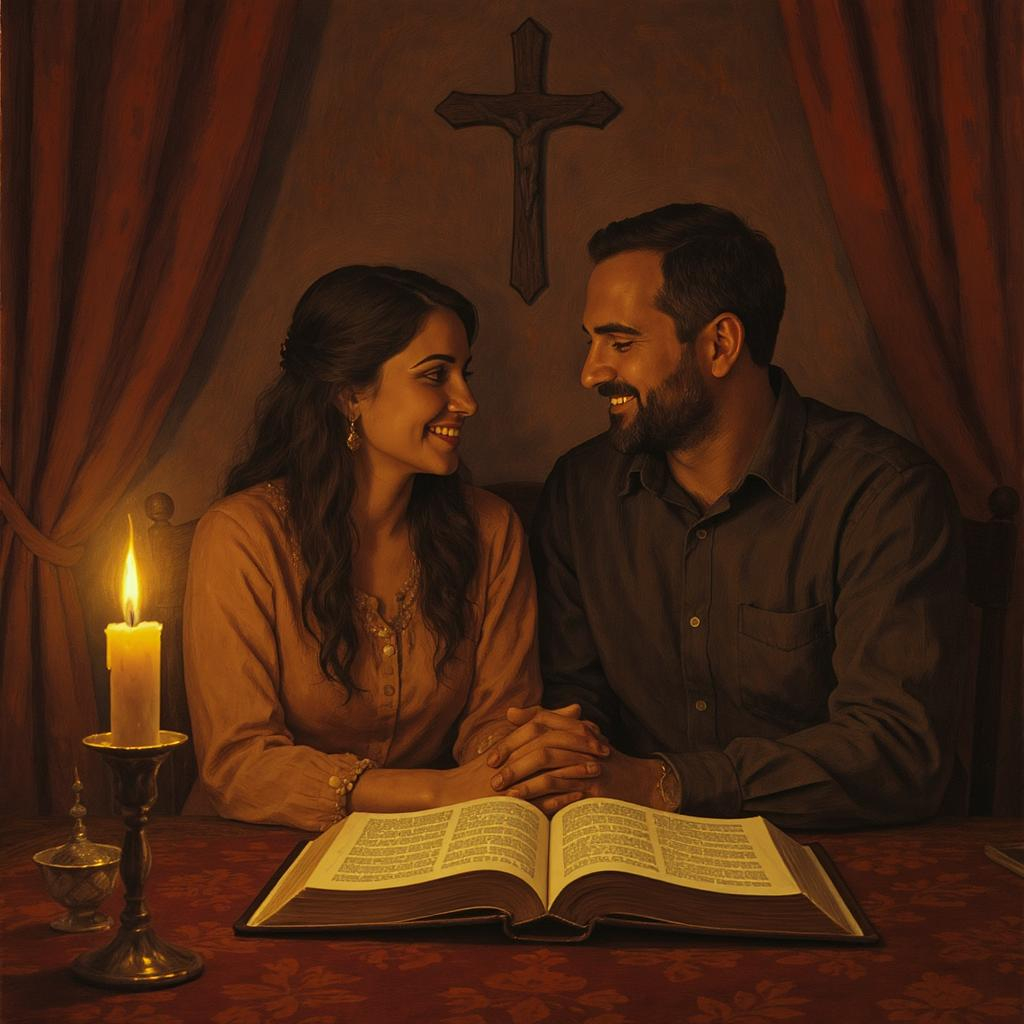God’s Design for Man and Woman: A Comprehensive Case for Complementarianism, Part 7
Posted on 07/28/2025 at The Curmudgeon’s Chronicle

Complementarianism in Marriage: Roles and Responsibilities
In her 1995 book Battered Love, Renita Weems critiques biblical marriage metaphors, arguing that “the correlation drawn repeatedly in prophetic literature between divine judgement and husbands battering their wives is haunting and telling,” suggesting that these metaphors reflect patriarchal norms that link a woman’s love for a man with violence against her, not divine intent. Meanwhile, Tom Shipley, a “Biblical Patriarchy” advocate, writes in Man and Woman in Biblical Law, “The validity of polygyny is an immediate logical consequence of patriarchy. Polygyny is patriarchy in action,” claiming Genesis permits men to lead multiple wives as a moral good. Both voices – from egalitarianism’s rejection of distinct roles to polygamy’s patriarchal excess – captivate audiences yet miss Scripture’s blueprint. Ephesians 5:22-33 paints a different picture: husbands leading with Christlike sacrifice, wives submitting with joyful partnership, reflecting the gospel. What does God’s design for marriage really look like? Let’s explore how complementarianism offers clarity amid these extremes, grounding us in biblical truth.
The Stakes of Biblical Marriage
Marriage is no mere contract; it’s a divine institution reflecting Christ’s love for His church (Ephesians 5:32). More than that, it’s part of God’s grand plan to “gather together in one all things in Christ, both which are in heaven, and which are on earth; even in him” (Ephesians 1:10), uniting all creation under Christ’s headship, as David W. Jones and Andreas J. Köstenberger note. This salvation-historical purpose weaves marriage into God’s redemptive work, uniting believers – men and women, Jews and Gentiles – in Christ’s body, the church. Yet, voices like Weems and Shipley pull couples in opposite directions. Weems’ egalitarian push for fluid roles, based on gifting, erases distinctions rooted in Genesis 2, where Eve is created as עֵזֶר (ezer, helper) to complement Adam. Shipley’s “Biblical Patriarchy,” advocating polygyny and authoritarian control, distorts headship into domination, echoing abuses we have critiqued previously (e.g., Vision Forum’s collapse). These extremes – role homogenization and patriarchal excess – threaten biblical clarity, leaving couples adrift.
This series has built a case for complementarianism: men and women, equal in worth but distinct in roles, glorify God. We’ve laid the groundwork – from Genesis 2 establishing complementary roles, to New Testament passages like 1 Timothy 2:12 affirming male leadership in the church, to biblical masculinity and femininity calling men to lead humbly and women to shine with wisdom. Now, we apply complementarianism to marriage, exploring husbands’ loving leadership and wives’ joyful submission, addressing objections, and offering practical guidance. Can distinct roles reflect equality and glorify God? Ephesians 5:22-33, our anchor, says yes, pointing to the gospel’s beauty in God’s redemptive plan.
Husband’s Role: Loving Leadership (Ephesians 5:25-33)
Ephesians 5:25 commands, “Husbands, love your wives, even as Christ also loved the church, and gave himself for it”. The Greek term κεφαλή (kephalē, head) in verse 23 – “the husband is the head of the wife, even as Christ is the head of the church” – denotes authority, not “source,” as egalitarians might suggest (BDAG). Paul’s use of headship in Ephesians 1:10, where God gathers all things under Christ’s authority (ἀνακεφαλαιώσασθαι, anakephalaiōsasthai), confirms this, as seen in Christ’s rule over all powers (Ephesians 1:21–22). This leadership, however, is sacrificial, modeled on Christ’s self-giving love, not domination. Jesus declares in Mark 10:45, “The Son of man came not to be ministered unto, but to minister, and to give his life a ransom for many.” Likewise, husbands lead by serving.
Consider Boaz in Ruth 2-4. He protects and provides for Ruth, reflecting care, not control. This echoes Genesis 2:15, where the man (הָאָדָם, hā-ʾādām) is tasked with stewardship. Yet, “Biblical Patriarchy” advocates distort this, claiming a husband’s headship is absolute, akin to Christ’s divine authority, since Ephesians 5:23 compares the two. This misreads Scripture: Christ’s headship is unique, rooted in His deity (Colossians 2:9), while husbands, as fallible humans (Romans 3:23), wield limited authority. Ephesians 5:25–28 defines headship as sacrificial love, not domination, urging husbands to “nourish and cherish” their wives, not control them. Ephesians 5:23’s analogy compares function (leadership), not degree of authority. 1 Peter 3:7 calls husbands to honor wives as “joint heirs,” requiring mutual respect, not unilateral rule. 1 Corinthians 11:3 places Christ as the husband’s head, checking any absolute power. Unlike Biblical Patriarchy’s micro-control – dictating clothing or friendships – biblical headship serves, reflecting Genesis 2:24’s “one flesh” partnership, not tyranny. Husbands are servants, not kings.
So, how does a husband live out this calling? Begin by serving your wife sacrificially, prioritizing her spiritual and physical well-being, as Ephesians 5:28 urges. Think of Isaac, who prayed earnestly for Rebekah’s barrenness (Genesis 25:21), fostering intimacy through his care for her needs, a model of nurturing love. Contrast this with Jacob, whose wife Rachel, in her barrenness, demanded, “Give me children, or else I die” (Genesis 30:1). Jacob’s angry retort, “Am I in God’s stead?” (Genesis 30:2), lacked the servant leadership Isaac showed, escalating conflict rather than nourishing his wife. Husbands, emulate Isaac’s humility, not Jacob’s frustration, rejecting domineering responses that echo “Biblical Patriarchy.” Foster unity by making decisions together, respecting her wisdom as 1 Peter 3:7 instructs, rather than falling into authoritarian traps like dictating her wardrobe or media choices, as some “Biblical Patriarchy” advocates might. Above all, reject abuses – whether polygyny or micro-control – that distort headship, leading with the humility and love of Christ, not the dominance of patriarchal excess.
Wife’s Role: Joyful Submission (Ephesians 5:22-24, 1 Peter 3:1-6)
Ephesians 5:22 instructs, “Wives, submit yourselves unto your own husbands, as unto the Lord.” The Greek ὑποτάσσω (hypotassō, to place under authority) implies voluntary partnership, not inferiority (BDAG). Submission reflects the church’s trust in Christ (Ephesians 5:24), echoing Eve’s role as עֵזֶר (ezer, helper) in Genesis 2:18 and aligning with God’s redemptive design to unite all things under Christ’s headship. 1 Peter 3:1–6 cites Sarah, who honored Abraham, as a model of trusting God’s plan.
Abigail in 1 Samuel 25 exemplifies this. When her husband Nabal acts foolishly, she wisely intervenes, saving lives without usurping leadership. Indeed, as Christ’s submission to the Father shows, submission is a gospel picture reflecting strength, not weakness. Unlike the egalitarian call for role fluidity, submission embraces God’s distinct design with joyful partnership, free from the authoritarian constraints of “Biblical Patriarchy.”
What does submission look like in practice? Embrace partnership by supporting your husband’s leadership with the wisdom of Proverbs 31:26. Think of Priscilla, who, alongside Aquila, taught Apollos with discernment (Acts 18:26), enhancing their shared ministry while honoring her husband’s lead. Cultivate trust, submitting “as unto the Lord” (Ephesians 5:22), resting in God’s plan for your marriage. And don’t fall into passivity – submission is active, like Abigail’s bold initiative, not silent compliance under domineering control, which “Biblical Patriarchy” might impose. Your strength shines in joyful, purposeful partnership.

Addressing Objections: Submission and Abuse
Complementarian marriage faces fierce objections, from egalitarian homogenization to “Biblical Patriarchy” excesses. Let’s address these biblically, ensuring clarity.
Objection 1: Submission Equals Inferiority
Renita Weems argues in Battered Love that marriage metaphors, like God punishing a disobedient wife, reflect cultural patriarchy, implying roles like submission are human constructs. Egalitarians advocate fluid roles based on gifting, erasing distinctions. This resonates in a culture prizing sameness, but it falters scripturally.
Ephesians 5:32 ties submission to the gospel: the church submits to Christ, reflecting the wife’s role in marriage. Yet, wives are equal in worth to husbands, as affirmed by Genesis 1:27 (equal image-bearing) and 1 Peter 3:7 (“joint heirs”). Thomas Schreiner clarifies that “a difference in function” does not mean “a difference in essence.” He notes, “Women are equal to men in essence and worth,” using the Christ-Father relationship to show that submission does not imply inferiority. Evangelical feminists often misstep here, assuming role distinctions denote lesser value, but Schreiner counters that “such differences do not logically imply inequality.” Egalitarian views risk distorting the gospel by flattening creation’s order (1 Timothy 2:13), ignoring the beauty of complementary roles.
Objection 2: Leadership Enables Abuse
“Biblical Patriarchy,” as seen in movements like Vision Forum, distorts headship into authoritarian control, treating husbands as “prophets, priests, and kings” with near-divine authority. Bill Gothard’s “umbrella of authority” taught husbands to enforce strict obedience, while Douglas Phillips’ “Tenets of Biblical Patriarchy” urged control over wives’ friendships, clothing (e.g., mandating dresses), reading (e.g., banning secular books), and online activity (e.g., monitoring social media), as we’ve critiqued previously. Some, like Tom Shipley, extend this to polygyny, claiming that polygyny is a logical affirmation of male headship, but this rare view stems from the same authoritarian root.
Ephesians 5:25 casts headship as sacrificial love, not authoritarian control. Scripture calls husbands to lead gently (1 Timothy 3:4–5), rejecting domineering models of authority. Biblical examples like Abraham’s conflict with Hagar (Genesis 16:4–6) and Jacob’s rivalry with Leah and Rachel (Genesis 30:1–8) highlight polygyny’s dysfunction, underscoring that it deviates from God’s design. Complementarianism opposes both micromanaging leadership and polygyny, urging husbands to serve, not oppress, in contrast to the excesses of Biblical Patriarchy.
Furthermore, Ephesians 5:21–33 firmly rejects the notion, sometimes pushed in “Biblical Patriarchy” circles, that husbands may punish their wives. Paul strikingly addresses wives themselves (v. 22), urging voluntary submission, and husbands (v. 25), urging sacrificial love, a bold departure from 1st-century Roman norms. For example, Pliny the Younger, in a letter to his wife’s aunt, praises her “incomparably discerning” nature and devotion, addressing a relative rather than the wife directly, as was typical in Roman discourse (Epistulae 4.19). Paul’s approach, by contrast, subverts this convention, treating wives as moral agents accountable to Christ, not as subordinates controlled by husbands. No scripture authorizes spousal punishment, which contradicts the gospel’s call to serve. Each spouse must focus on their own role – love or submission – and trust the Holy Spirit to shape their partner (v. 21). Complementarianism opposes micromanaging leadership, polygyny, and punishment, urging husbands to serve, not oppress, in contrast to the excesses of Biblical Patriarchy.
Objection 3: Roles Are Culturally Outdated
Egalitarians, like William Webb in Slaves, Women & Homosexuals, argue that Ephesians 5:22–33 reflects 1st-century patriarchal norms, urging couples to move beyond fixed roles toward a “redemptive-movement” hermeneutic that prioritizes modern equality. This view appeals to contemporary values of sameness, suggesting that distinct roles like headship and submission are outdated cultural artifacts.
Yet, this approach misreads Scripture by subordinating its timeless truths to cultural trends. Paul grounds marital roles in creation – “For Adam was first formed, then Eve” (1 Timothy 2:13) – and in Christ’s headship over the church (Ephesians 5:23; 1 Corinthians 11:3), not in Greco-Roman customs. As Thomas Schreiner notes, these roles reflect theological realities rooted in God’s design, not temporary cultural norms. The “redemptive-movement” hermeneutic risks flattening the gospel’s distinctiveness, erasing the complementary roles that mirror Christ’s sacrificial love and the church’s trust (Ephesians 5:32). Complementarianism, by contrast, upholds both equality in worth (Genesis 1:27; Galatians 3:28) and distinction in function, preserving the beauty of God’s order. Egalitarian homogenization may resonate in a culture prizing uniformity, but it dilutes Scripture’s call to reflect the gospel through ordered partnership. How do egalitarian arguments about cultural relevance shape your view of biblical marriage roles? Share your thoughts below.

Practical Tips: Navigating Marriage Dynamics
How do couples live out Ephesians 5? Picture Mark and Anna, navigating a job relocation. Mark seeks Anna’s input and their pastor’s godly counsel, praying together while leading with humility. Anna supports his decision, offering wisdom without undermining. Or consider James and Rachel, deciding on their child’s schooling. James listens to Rachel’s insights, leading prayerfully, while Rachel supports his direction, offering expertise. Or picture Tom and Sarah, budgeting for a home. Tom values Sarah’s financial insight, leading prayerfully, while Sarah supports his direction, showing mutual respect. Their mutual respect rejects Biblical Patriarchy’s control and egalitarianism’s role-blurring. Follow their example by communicating openly, as 1 Peter 3:7 urges, praying together to ground decisions in faith. Husbands, honor your wife’s wisdom (Proverbs 31:26); wives, affirm his leadership (Ephesians 5:33), free from domineering control. Resolve conflicts humbly, avoiding Biblical Patriarchy’s micro-control (Mark 10:45) or undermining (1 Peter 3:1). Seek godly counsel when needed, as Proverbs 15:22 advises, study Ephesians 5 together, and attend church to grow spiritually, anchoring your marriage in Scripture’s truth.
The Gospel in Marriage
Ephesians 5:32 proclaims, “This is a great mystery: but I speak concerning Christ and the church.” Marriage, in its God-ordained design, reflects the profound union of Christ’s sacrificial love and the church’s trusting submission. Husbands, called to “love your wives, even as Christ also loved the church, and gave himself for it” (Ephesians 5:25), embody Christ’s selflessness. Wives, urged to “submit yourselves unto your own husbands, as unto the Lord” (Ephesians 5:22), mirror the church’s joyful partnership. This gospel mystery sets marriage apart from the world’s distortions. Egalitarianism, by blurring roles, misses the beauty of this divine picture, while “Biblical Patriarchy,” with its authoritarian excess, perverts headship into domination. Complementarianism, rooted in Scripture, upholds the equal worth of man and woman (1 Peter 3:7, “heirs together of the grace of life”) while celebrating their distinct callings, glorifying God through ordered love.
Brothers and sisters, trust God’s design for your marriage. Reject the homogenization that strips away the gospel’s distinctiveness and the patriarchal control that burdens with oppression. Embrace the freedom of Ephesians 5’s clarity: husbands, lead with the humble sacrifice of Christ; wives, partner with the church’s radiant trust. Let your marriage shine as a testimony to the gospel, fulfilling Ephesians 5:33: “Let every one of you in particular so love his wife even as himself; and the wife see that she reverence her husband.” This is no mere duty but a joyful calling, transforming your union into a living reflection of Christ’s redemptive love. How will you live out this gospel mystery in your marriage today?
Conclusion: Trusting God’s Design
Ephesians 5:22-33 anchors complementarian marriage: husbands lead sacrificially, wives submit joyfully, reflecting Christ and the church. Weems’ egalitarian push for fluid roles and “Biblical Patriarchy,” with its authoritarian control and rare distortions like polygyny, distort Scripture’s blueprint. Husbands, love like Christ; wives, partner like the church; together, study God’s Word, praying for wisdom.
Our next post explores complementarianism in church roles, tackling deacons, head coverings, and more. How can couples live out Ephesians 5 today? What challenges do you face in balancing leadership and submission? Share in the comments, and let’s journey through Scripture together, trusting God’s design for marriage.
References
- Renita J. Weems, Battered Love: Marriage, Sex, and Violence in the Hebrew Prophets, Kindle edition (Minneapolis, MN: Fortress Press, 1995), Introduction, para. 4 .
- Tom Shipley, Man and Woman in Biblical Law (Baltimore, MD: Institute for Christian Patriarchy, 2004), 131.
- William Arndt et al., A Greek-English Lexicon of the New Testament and Other Early Christian Literature (Chicago: University of Chicago Press, 2000).
- David W. Jones and Andreas J. Köstenberger, God, Marriage, and Family: Rebuilding the Biblical Foundation (Wheaton, IL: Crossway Books, 2010), 55-58.
- Thomas R. Schreiner, “Head Coverings, Prophecies, and the Trinity: 1 Corinthians 11:2–16,” in Recovering Biblical Manhood & Womanhood: A Response to Evangelical Feminism, ed. John Piper and Wayne Grudem (Wheaton, IL: Crossway, 2006), 128.
- Pliny, Letters, Vols. 1 & 2, ed. T. E. Page et al., trans. William Melmoth, vol. 1, The Loeb Classical Library (London; New York: William Heinemann; The Macmillan Co., 1931), 333.
- William J. Webb, Slaves, Women & Homosexuals: Exploring the Hermeneutics of Cultural Analysis, Kindle edition (Downers Grove, IL: InterVarsity Press, 2001.
- Thomas R. Schreiner, “An Interpretation of 1 Timothy 2:9–15: A Dialogue with Scholarship,” in Women in the Church: An Interpretation and Application of 1 Timothy 2:9–15, ed. Andreas J. Köstenberger and Thomas R. Schreiner, Third Edition (Wheaton, IL: Crossway, 2016), 184–225.